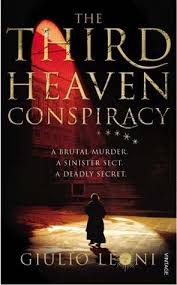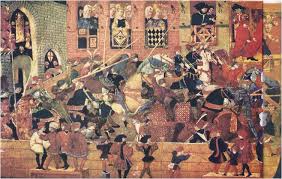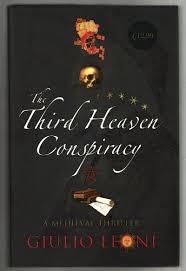Good Reads meta-data is 321 pages, rated 2.82 by 800 litizens.
Genre: Krimi; Species: Historical period.
DNA: Italian; Florentine.
Verdict: Nicely done.
Tagline: Hell is right here, right now.

June in the year of 1300, Durante Alighieri, who prefers to be known as Dante, is one of the six Priors who serve a two-month term of office, rather like a city council with executive powers. He is pleased with this preferment until the chief of the guard, whom he regards as a dolt (and who regards him as a puffed up popinjay) asks him to attend a crime scene in a long-abandoned church. As he picks his way through the rubble in the city streets left by the latest battle between the Guelphs and Ghibellines, Dante ponders on the cesspool that Florence is sliding into.
At the church he finds a talented mosaic artist who has been murdered and mutilated. He is tempted to let the Guard deal with the crime the way he usually does: arrest the nearest beggar and torture him into confessing: Case closed. Policing has never changed it seems. But there are intellectual puzzles in this case and Dante pursues them.
Then there is a strange conclave in a sleazy tavern of men who claim to be founding a studium in Florence, that is, a university. Dante seeks their company and this accomplished poet is most welcome, but…. Is all as it seems? Or is it not. Place your bets!
It is a time when failed crusades to the holy land have undermined many verities. Moreover, anyone who has been to the East is tainted. There is a prologue that provides that orientation.

Then there are rumours that an heir to the Holy Roman emperor yet lives and that makes the ever so corrupt Pope worry. Such an heir might threaten the Pope’s hold on the throne. His reputation for incompetence was only bested by his reputation for greed, gluttony, and rapine. Now who does that remind me of?
Having only recently listened to Dante’s Inferno on my foot patrols I noticed many incidents in this novel that recall passages in it. According to our author then, Dante found much of Hell on the streets and byways of Florence. Nicely done that. These references are codified in an afterword I discovered when I got there.
I also savoured the portrayal of the other priors, who like the prestige of the assignment, but are loath to do any of the work that is supposed to go with it. I could not help but recall all those university colleagues who festooned their CVs with every committee assignment they ever had, and laboured to avoid doing any of the committee’s work, mainly by never attending meetings.

